With beautiful islands, sun-kissed beaches and ancient ruins, it’s not surprising that Greece is one of the most popular places in Europe for a holiday. It has at least 250 days of sunshine, with some islands, such as Crete, turning on the sun over 300 days. 8,500 miles of coastline offer up many beaches where you can sunbathe, swim and participate in water sports. But if you’d prefer sightseeing, you’ll find no shortage of impressive museums and ancient sites dating back as far as 4000 years. 19 sites, including the famous Acropolis in Athens, are on the UNESCO World Heritage List.
At these sites, you can learn about the gods and goddesses the people have worshipped for centuries and visit the temples dedicated to them. Greek people are known for being hospitable, friendly, and keen to help tourists have the best holiday they have ever had. They express themselves through food and dancing and will encourage you to try things you have never tried before.
Their cuisine is Mediterranean, with plenty of vegetables, pulses, and legumes on offer, all cooked in healthy olive oil. If you are invited to a Greek home, be prepared for large portions and great hospitality. You will learn that the Greek culture is deeply rooted in tradition and that family is the most important aspect of their lives. Let’s now take a look at the top 15 iconic things that symbolise Greece.
Contents
- What Is Greece Known For?
- Top Tours
- 1- The Birthplace Of Democracy
- 2- The Acropolis
- 3- Greek Mythology
- 4- The Greek War Of Independence
- 5- The Greek Alphabet
- 6- The Birthplace Of The Olympic Games
- 7- Beautiful Islands
- 8- Unusual Beaches
- 9- Great Weather
- 10- Greek Cuisine
- 11- Ouzo, Raki And Metaza
- 12- Olives And Olive Oil
- 13- The Samaria Gorge
- 14- The Only Place To See The Kri-Kri
- 15- Greek Dancing
What Is Greece Known For?
Top Tours
- Classic Greece: 7 Day Guided Tour of Greece – get a taste of the best of Greece.
- Athens: Acropolis and Parthenon Guided Walking Tour – one of the most iconic landmarks in Greece.
- Zakynthos Island: Navagio Shipwreck Beach – extremely popular and includes a Blue Caves tour.
1- The Birthplace Of Democracy
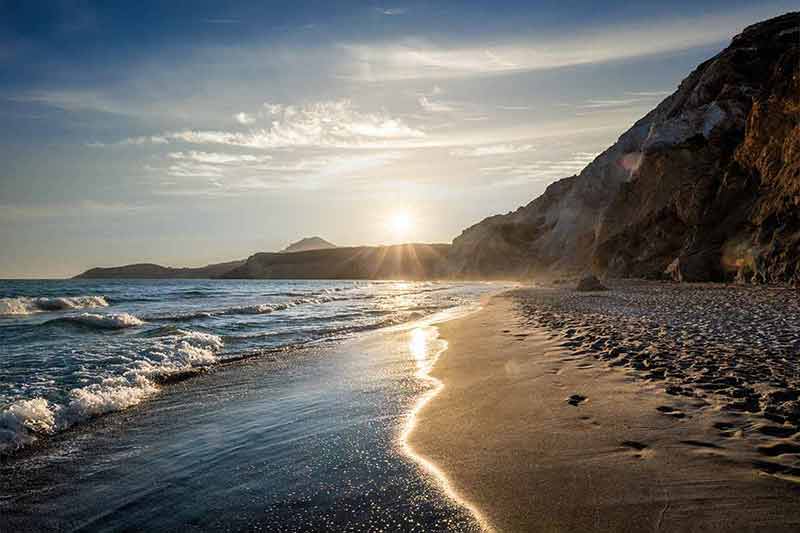
Unfortunately, not all countries practice democracy, although many do.
Perhaps you have wondered where democracy started, and the answer to this is Greece.
The Greeks developed democracy as far back as the 5th century BC, when Athens was a city-state ruled by aristocrats.
The majority of citizens felt that the people should rule the government, and it was decided then that all free male citizens would be able to vote for the government. But unfortunately, women weren’t included.
Democracy translates roughly to ‘power to the people’, and that is what now exists in many countries today, even though it took centuries for the concept to be adopted.
In addition, trial by jury also originated in the 5th century BC.
At this time, the jurors weren’t assigned days to work but came in when they were willing to serve.
Ancient Rome took on this system in the 4th century BC, but it didn’t appear in the UK until the 11th century.
2- The Acropolis
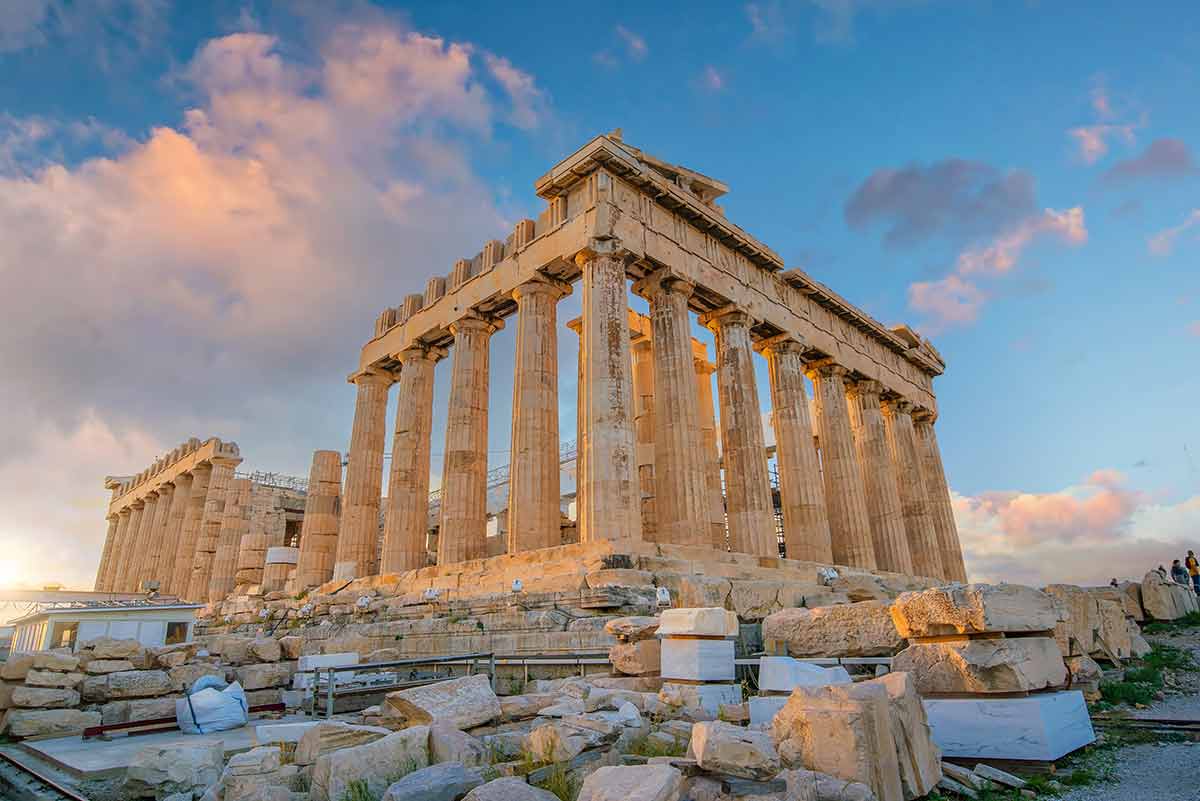
The Acropolis in Athens is a famous hilltop citadel built for Athena, the patron goddess of Athens, during the 5th century BC.
It contains the remains of the Sanctuary of Artemis Brauronia, a cult dedicated to the goddess of hunting, and the Erechtheum, a shrine to the agricultural deities.
The most important building is the Parthenon, a temple dedicated to Athena, built between 447 and 432 BC on the site of the old Parthenon.
The massive columns remain, giving you an idea of what the once-impressive temple must have looked like in ancient times.
The Parthenon is currently being restored, although part of it will remain in ruins.
One of the city’s best museums, the Acropolis Museum, houses 4,000 artefacts from the site, including statues and friezes.
Another part of the site worth spending time at is the Agora at the Acropolis’ base, which was the political, commercial and social centre of ancient Athens and where merchants traded.
3- Greek Mythology
The gods and goddesses worshipped by the ancient Greeks need no introduction and stories surrounding them have cemented their legendary status in the history books.
All the gods lived on Mount Olympus, the highest mountain in Greece (2917 metres/9,572.59 feet) and were led by the king of the gods, Zeus, who had seven wives, the most important being Hera, who was also his sister.
Throughout Greece, you will find statues of the gods and goddesses, as well as temples dedicated to them.
Apart from the Parthenon, which is dedicated to the goddess Athena, the daughter of Zeus, if you are staying on the island of Mykonos, visit the nearby island of Delos on a day trip.
It’s where the twin gods, Artemis and Apollo, were born.
In addition, on Mount Kythnos’s peak, a sanctuary is built to honour Zeus.
Delos is such an important archaeological site that you can only visit it on a day trip, and nobody lives there.
You will be rewarded with ruins of streets, temples, and statues, and there is a museum showcasing many artefacts from the island.
The Palace of Knossos, on the island of Crete, is another popular historical attraction for anyone interested in Greek mythology.
This was where Theseus, son of the king of Athens, went to Crete to kill the Minotaur, who was half bull and half man and roamed the labyrinth in the court of King Midas.
Also on Crete, explore Ideon Cave, the birthplace of Zeus, the king of the gods.
4- The Greek War Of Independence
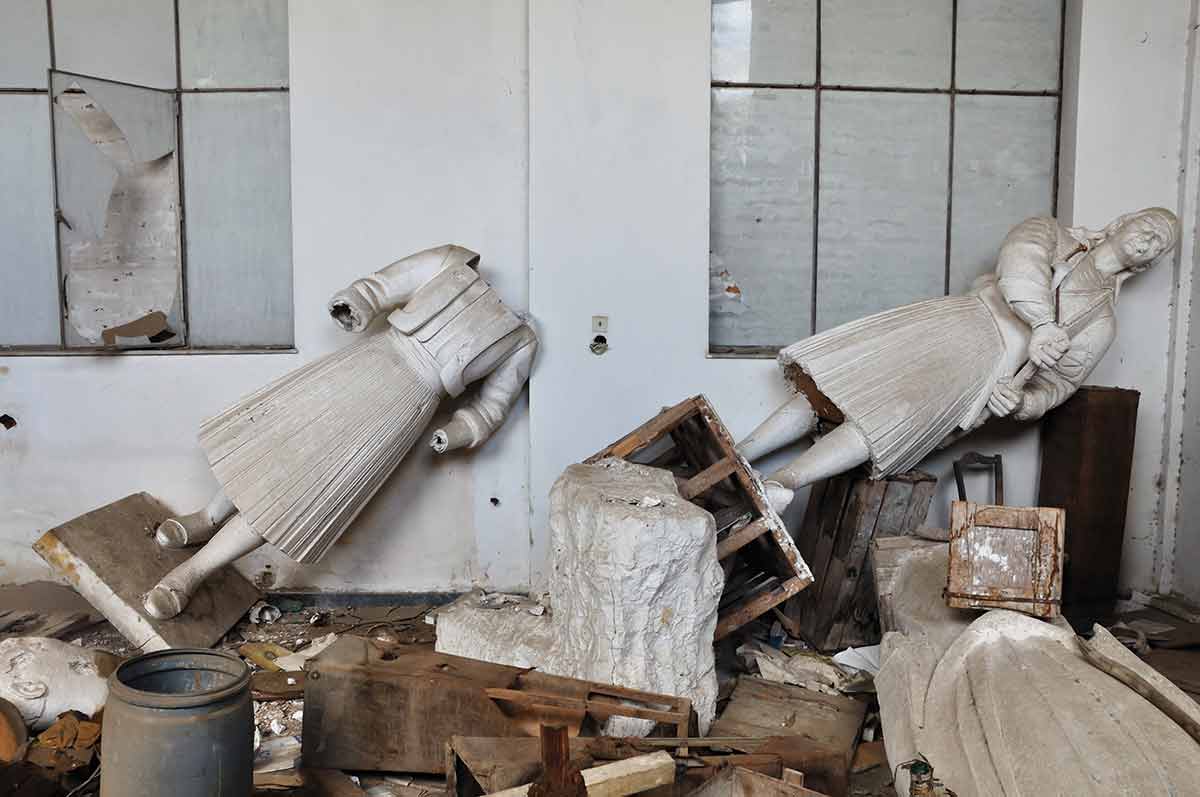
After four centuries under the thumb of the Ottoman Empire, the Greek War of Independence erupted on 25 March 1821.
Rebel leader Alexander Ypsilantis took up arms against the Turks and although he was defeated, other rebels took over the cause.
Assisted by the British, the French and the Russians between 1826 and 1827, Greece finally gained independence in 1829.
This war also had an unusual amount of support from Philhellenes (volunteers from USA and Europe) who were passionate about Greece’s freedom.
British poet Lord Byron was a prominent Philhellene who supported this revolution by writing passionately about the Greek cause and he even used some of his own funds to help the resistance.
In 1832, the Treaty of Constantinople officially recognised the Kingdom of Greece.
25 March is now a public holiday, and marches are held in towns and cities to commemorate the independence of Greece.
The Greeks are proud of their hard-fought independence and cultural heritage.
25 March also coincides with the Greek Orthodox celebration of the Annunciation, which, according to their religion, was the day the angel Gabriel told the Virgin Mary that she would carry the son of God.
This makes it a double celebration for the Greeks, who are a religious nation.
So, if you’re looking for an especially significant time to visit, mark the end of March on your calendar.
5- The Greek Alphabet
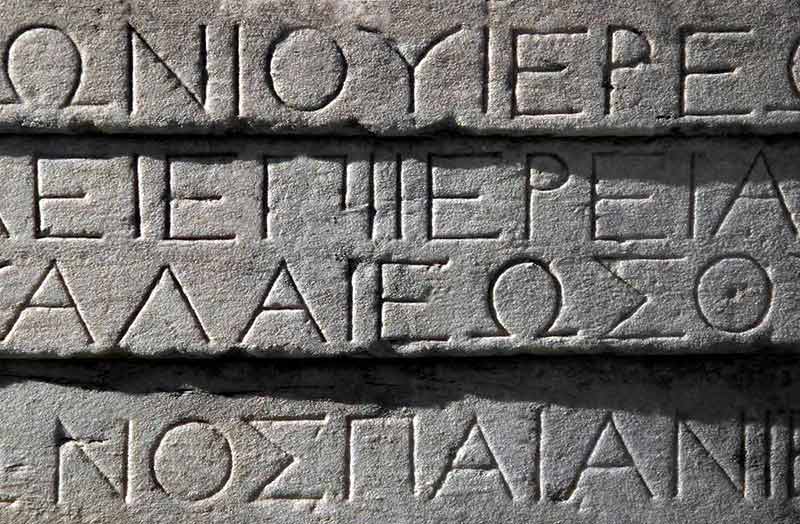
The Greek alphabet is not the same as the English alphabet, which can make things a little more difficult if you are visiting the country.
However, because Greece is geared up for tourism, you will find that things like road signs are also written in English.
In restaurants and tavernas, there’s nearly always an English translation or a separate menu.
The Greek alphabet is considered to be the first complete alphabet in world history, derived from a simpler alphabet, the Phoenician.
It is believed to have been developed around 800 BC.
One of the differences between the Greek alphabet and the English alphabet is that it has 24 letters, not 26.
The letters are written differently as well, and they have a name as well as a sound; for example, A is alpha and E is epsilon.
It is interesting to note that the word ‘alphabet’ comes from the first two letters of the Greek alphabet, alpha and beta.
Also read:
- 20 Movies About Greece
- 20 Incredible Greek Landmarks
- 20 Famous Landmarks In Athens
- 20 Fairytale Castles In Greece
- When To Visit Greece
- 20 Beaches In Greece
- 20 Things To Do At Night In Athens
- 20 Day Trips From Athens
- 20 Cities In Greece You Will Love
- 20 Best Beaches in Mykonos
- A Guide To Winter In Greece
- 20 Things To Do In Mykonos
- 20 Things To Do In Rhodes
- Where To Stay In Athens
- 20 Museums in Athens
- 20 Things To Do In Santorini
- Best Greek Islands To Visit
- Car Rental Athens Tips
- Car Rental Mykonos Tips
- Where To Stay In Crete
- 20 Greece Tours For Your Bucket List
- 15 Things Greece Is Famous For
- 10-day Greece Itinerary
6- The Birthplace Of The Olympic Games

Did you know that the Olympic Games began in Greece as far back as 776 BC? They were set up to honour the king of the gods, Zeus, and they were held, as now, every four years.
They ended in 393 AD, and it wasn’t until 1896 that the first modern Olympic games were held in Athens, Greece.
From then on, different cities were chosen to host the games, but the Olympic flame-lighting ceremony still takes place in Olympia, where the ancient games were held.
The first twelve games of the ancient Olympics only consisted of one race of 190 metres (623 feet), but they were then expanded to 18 events taking five days to complete.
Any Greek man could compete, but women in ancient Greece weren’t allowed to take part.
At Olympia, you can visit the archaeological site where the games were held.
You will be able to see the remains of the stadium, gymnasium, and dormitories where the athletes stayed.
7- Beautiful Islands
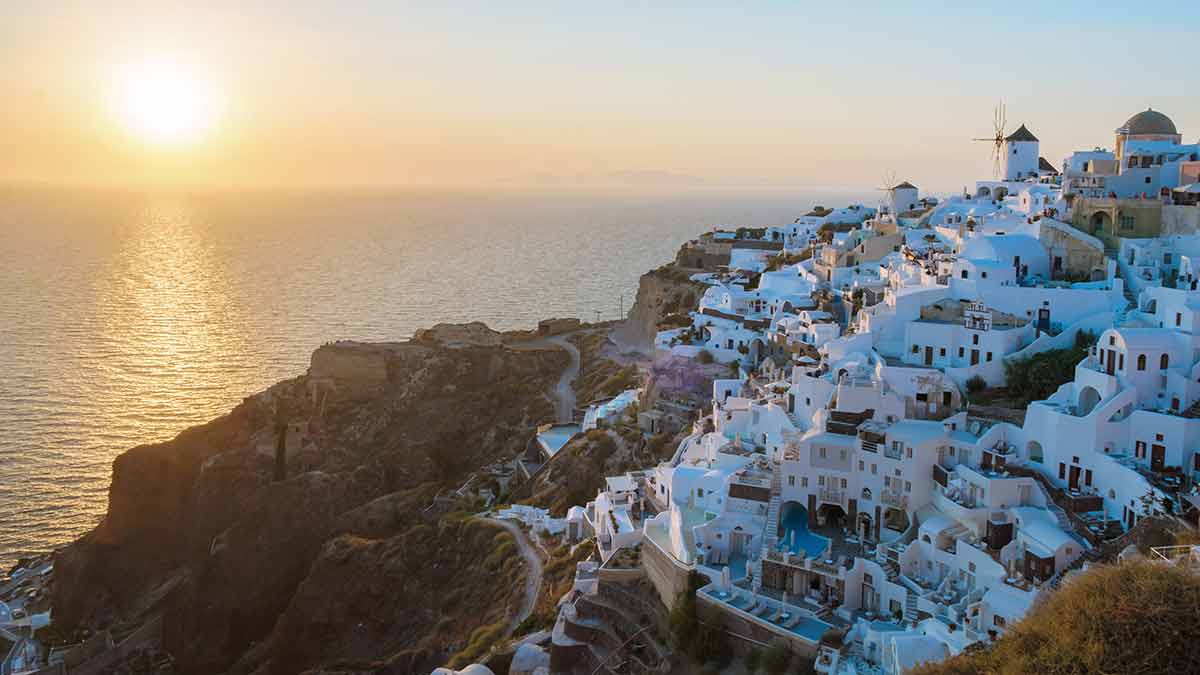
There are over 6,000 islands and islets belonging to Greece, with around 200 of them being inhabited.
These beautiful islands often represent Greece with their sun-kissed beaches and spectacular sunsets, but there is even more to recommend them, such as ancient sites, monasteries, and picturesque old towns and harbours.
The largest and most southern of the Greek islands is Crete, which envelops all of the above and more.
It has many natural wonders, such as the Samaria Gorge, the longest gorge in Europe, and spectacular mountain ranges through the centre of the island.
Santorini, close to Crete, is a volcanic island where the pretty whitewashed houses of the two main towns, Fira and Oia, are perched on cliffs overlooking an underwater caldera.
Sunsets are spectacular from these cliffs.
Mykonos is known as the party island, with nightlife continuing until the early hours, while Rhodes is a mixture of ancient ruins, medieval castles, and stunning beaches.
It isn’t difficult to find an island to suit your requirements, as there is so much on offer.
8- Unusual Beaches
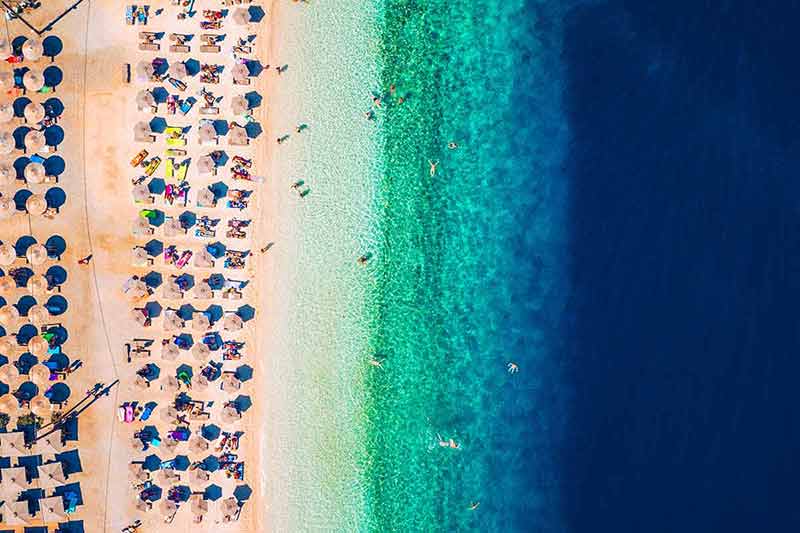
Greece has some of the best beaches in the Mediterranean and you’ll find a beach to suit any type of visitor, whether you are travelling as a family, a couple or a group of friends.
Even the party island of Mykonos has family-friendly beaches along with beaches for those who want to dance all night.
Wherever you go in Greece, you will find the beaches ready for you.
They have sunbeds and umbrellas, as well as water sports on offer.
There are usually seaside tavernas ready to cater to your food and drink needs.
Unusual beaches in Greece include the red and black beaches created by volcanic activity on the island of Santorini, which are stunning and completely safe.
In Crete, you will find the wonderfully picturesque pink beach of Elafonisi and in Zakynthos, Navagio Beach, also known as the shipwreck beach, is unique.
It has high cliffs behind it, white sand, and a spectacular shipwrecked boat on the beach.
9- Great Weather
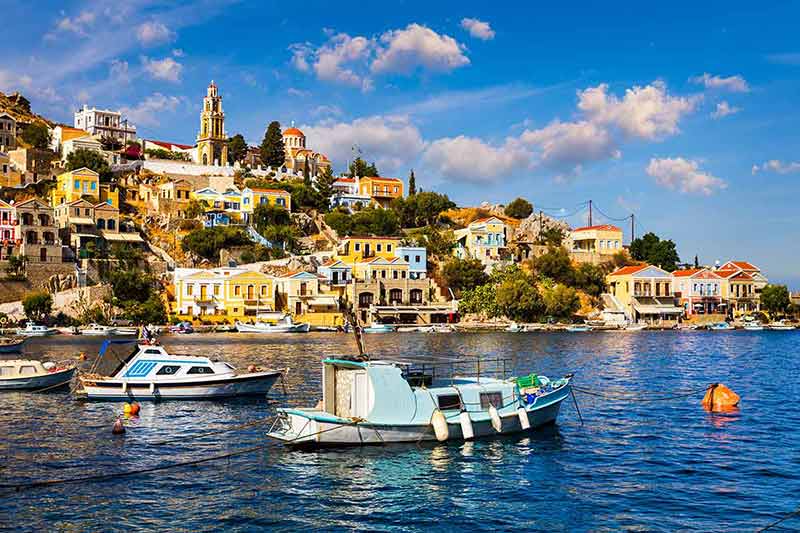
Greece is one of the sunniest places in the world.
It has, on average, 250 days of sunshine a year, with some places, like the island of Crete, getting over 300 days.
That’s not bad at all, is it?
Yes, Greece gets some winter weather and even snow in Athens, but the winters are short.
The weather can still be pleasant into November, and the worst months are generally January and February.
Spring flowers start to appear as early as February and are beautiful.
Summers can be sweltering in Greece, even reaching 40C (104F).
If you are a beach lover, this may suit you, but if you want to tour the archaeological sites, you may want to visit in the spring or autumn when the weather is warm but not sweltering.
10- Greek Cuisine

The Mediterranean diet has been practised in Greece for thousands of years.
It advocates eating plenty of vegetables, fruit, beans, legumes, and fish, with a limited amount of dairy and eggs and just a little meat.
It is known to be one of the healthiest diets in the world, and this seems to be true as you see many healthy elderly people.
When it comes to the national dish of Greece, there are two, one with meat and one without.
You have probably heard of moussaka, which is a type of pie with layers of minced lamb in a tomato sauce and aubergine slices (eggplant), with bechamel sauce on top as well as cheese.
Fasolada isn’t probably as well known the world over, but it is a cherished dish, especially in the winter.
It is a bean soup made with tomatoes, onions, carrots, white beans, olive oil, and parsley.
It is thick and best served piping hot with freshly baked bread.
Sometimes, chunks of the traditional Greek cheese, feta, are put in when serving.
It is a dish rich in protein, B vitamins, and iron, and the olive oil is jam-packed full of rich nutrients.
Recommended food tours:
11- Ouzo, Raki And Metaza

There are a few spirits that are endemic to Greece, and the first of these is ouzo, which I’m sure you’ve heard of.
It is a very popular drink and in Greece, there is a ritual surrounding it called the ouzo meze, which stops you from getting drunk too quickly.
To soak up the alcohol, you are presented with a meze consisting of small bites, such as dips, small slices of cheese and meat, olives and fresh bread or rusks.
A popular spirit, especially on the island of Crete, is raki, also known as tsikoudia and often given as a freebie or a gift at the end of a meal in tavernas.
It is a strong spirit, containing 40% to 65% alcohol by volume made by distilling pomace, which is the remains of the grapes after winemaking.
It is said to cure all ills, and who am I to argue?
Another Greek spirit is Metaxa, which can best be described as a Greek brandy.
It is made from a spirit distilled with a sweet wine from the island of Samos and a secret recipe of botanicals.
Metaxa is aged in French oak casks, and the number of stars the brandy has is the number of years it has been aged.
You can get three-star, five-star, and seven-star Metaxa. The longer it has been aged, the smoother it is.
12- Olives And Olive Oil
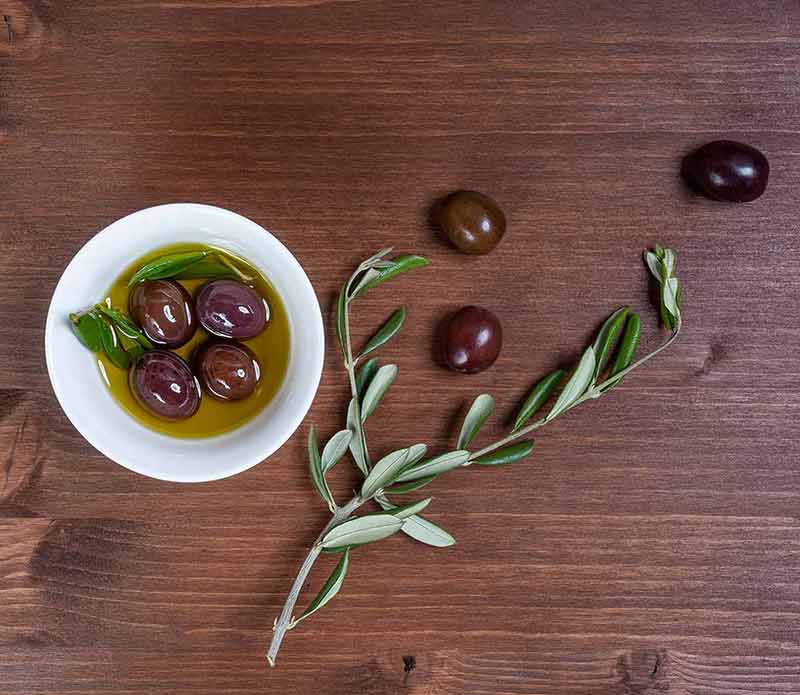
Greece is well-known for growing some of the best olives in the world and for producing excellent olive oil as well as table olives.
The history of olives goes back to ancient times, when the goddess Athena was said to have given Athens the gift of an olive tree.
Greece grows several types of olives, which are different in taste and texture.
65% of Greece’s olive oil production is in the Peloponnese and Crete, and together with the olive groves all over the country, 350,000 tons of olive oil are produced.
More than three-quarters of this is extra-virgin olive oil.
When it comes to table olives, 120,000 tons are produced.
This makes them both important agricultural exports.
Olive oil is used profusely in the country, with other oils taking a back seat.
They even cook their chips in it.
You will often find tavernas stating that everything is cooked in olive oil.
It is also great as a salad dressing or to simply dip in freshly baked bread.
13- The Samaria Gorge
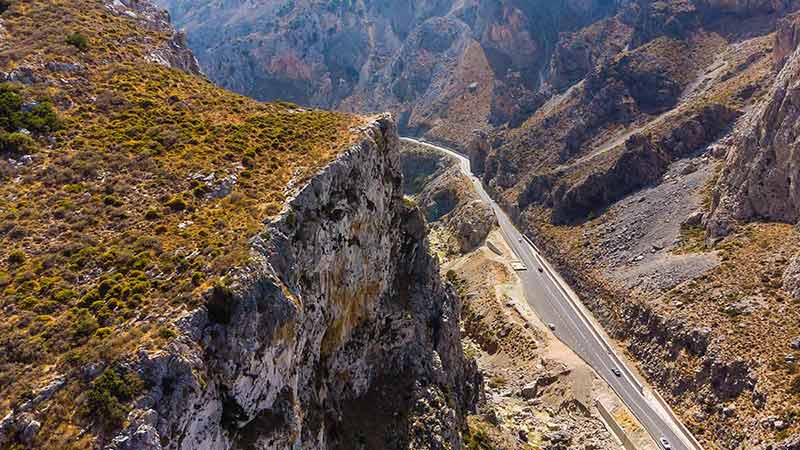
The Samaria Gorge is in Crete and is the longest gorge in Europe at 16 km (9.94 miles) long.
It is a popular hike but you do need to be physically fit to conquer it.
Apart from the distance, there are times when you have to climb over boulders.
The gorge begins in the White Mountains south of Chania and goes down to the Libyan Sea to the village of Agia Roumeli, where, because there are no road connections, you have to catch a boat to the village of Chorafakia.
Because the gorge starts and ends in different places, your best bet is to go on an organised tour.
You can catch a bus at either end, but that will mean waiting around and having to get to Chania, where the buses leave from.
If you take a tour, you will most probably be picked up from your hotel.
If you are fit, you will probably be able to hike the gorge in four to five hours.
Otherwise, look at seven hours or more.
The gorge is lovely in the spring when the wildflowers are out.
You might see wildlife such as the Cretan wild goat, the kri kri, as well as eagles and vultures.
14- The Only Place To See The Kri-Kri

The only place where you can see the wild goat, the kri-kri, is in Greece, and more specifically, in Crete.
There are a few in the Samaria Gorge but most are on three little islands close to Crete, the main one being Thodorou Island, close to Chania.
Here, the kri-kri are protected and allowed to live in the wild without any visitors.
The island covers just 282 hectares (697 acres), and if you go on a boat trip around the island, you can often see them scaling the rocky cliffs.
These wild goats are adept at climbing sheer cliffs and leaping great distances.
Kri-kri are probably more similar in appearance to ibex than goats.
They are light brown with a darker band around their necks and they have two horns that sweep away from their heads.
15- Greek Dancing
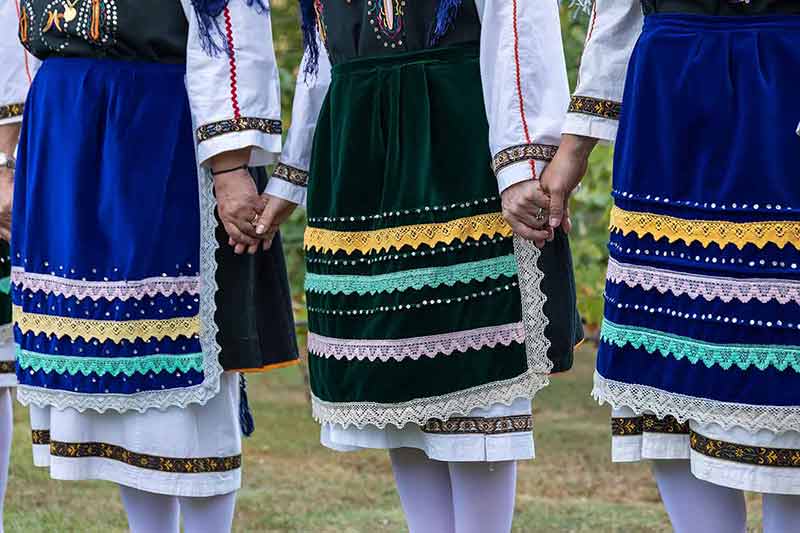
You have possibly seen Greek dancing on television and realised that it has a rhythm all of its own.
I have never been able to conquer the beat, but perhaps you will do better than me.
The dances have asymmetrical rhythms with five, seven, and nine beats.
The Greeks express themselves through dance.
Not only do they dance to celebrate such occasions as Easter, weddings, anniversaries, and baptisms, but they also dance to express regret and grieving.
It is a very old tradition going back thousands of years.
You may have seen the famous film Zorba the Greek, set on the island of Crete and featuring the sirtaki dance.
However, there are thousands more dances throughout the country.
Each region has its own dances with different styles and choreography, and there are more than 10.000 traditional Greek dances.
You will find that many hotels and tavernas will have a Greek night which involves a meal and a display of Greek dancing.
You will inevitably be invited to join in.
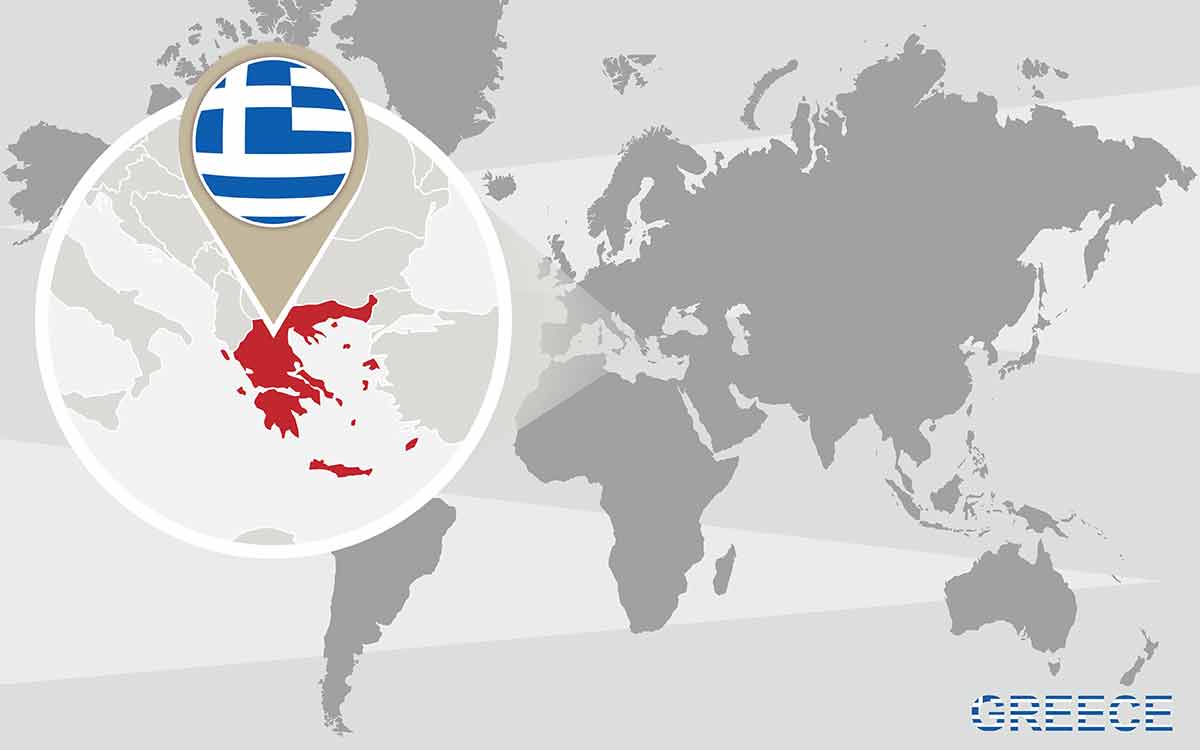
You may also be interested in:
- What is Turkey known for?
- What is Portugal known for?
- What is Greece known for?
- What is France known for?
- What is Belgium known for?
- What is Switzerland known for?
- What is Poland known for?
- What is Australia known for?
- What is Mexico known for?
- What is Germany known for?
- What is Croatia known for?
- What is Hungary known for?
- What Is Romania known for?
- What is The Netherlands known for?
- What is Scotland known for?
- What is Canada known for?
- What is Japan known for?
- What is China known for?
- What is Singapore known for?
- What is Vietnam known for?
- What is Thailand known for?
- What is Cuba known for?
- What is Argentina known for?
- What is Colombia known for?
- What is Spain known for?
- What is Italy known for?
- What is Ireland known for?
- What is Oregon known for?
- What is Colorado known for?
- What is Tennessee known for?
- What is Hawaii known for?
- What is Alabama known for?
- What is Illinois known for?
- What is Mississippi known for?
- What is Nevada known for?
- What is Maine known for?
- What is Idaho known for?
- What is Delaware known for?
- What is Maryland known for?
- What is Wisconsin known for?
- What is Miami known for?
- What is Virginia known for?
- What is West Virginia known for?
- What is Massachusetts known for?
- What is Boston known for?
- What is Florida known for?
- What is Kentucky known for?
- What is Indiana known for?
- What is Montana known for?
- What is Nebraska known for?
- What is Pennsylvania known for?
- What is Vermont known for?
- What is Arizona known for?
- What is California known for?
- What is South Carolina known for?
- What is North Carolina known for?
- What is Texas known for?
- What is Michigan known for?
- What is Ohio known for?
- What is Louisiana known for?
- What is Oklahoma known for?
- What is New York known for?
- What is Georgia known for?
- What is Utah known for?
- What is Connecticut known for?
- What is Rhode Island known for?
- What is Iowa known for?
- What Is Minnesota known for?
- What is New Hampshire known for?
- What is Arkansas known for?
- What is New Jersey known for?
- What is Missouri known for?
- What is North Dakota known for?
- What is South Dakota known for?
- What is Wyoming known for?
- What is Alaska known for?
- What is Washington known for?
- What is Seattle known for?
- What is New Mexico known for?
- What is Kansas known for?
- What is San Francisco known for?
- What is Chicago known for?
- What is Denmark known for?
- What is Norway known for?
- What is Sweden known for?
Plan Your Trip

Rent A Car – Find the best car rental rates at Discover Cars. They compare car hire companies to provide you with the best deal right now.

Find A Hotel – If you’re curious about this article and are looking for somewhere to stay, take a look at these amazing hotels.

